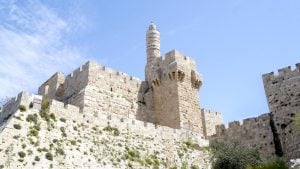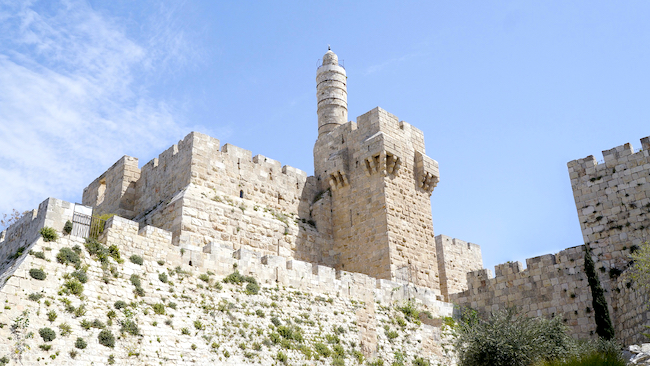
M’lochim I 2:1
This week’s haftorah records the last moments of Dovid Hamelech’s life and the parting charge which he delivered to his son, the newly anointed King Solomon. Dovid told his son, “Be strong and in full control of your emotions and guard all the precepts of the Torah.” (2: 2,3) Dovid assured Shlomo that if he and his descendants walked wholeheartedly in the path of Hashem they would be guaranteed the prestigious position of royalty for eternity.
Dovid then digressed and reminded Shlomo about two powerful men, Shimi and Yoav, who could never be forgiven for their unacceptable behavior. Each of them was guilty of disgracing the king through their shameful public conduct. Shimi Ben Geira had cursed the king and hurled stones at him while he fled from his son Avshalom who conspired against his own father. Yoav ben Tzruya had executed two opposing generals after Dovid Hamelech had warmly accepted their sincere gestures of peace. Dovid, now on his death bed, instructed his son Shlomo to be sharp and alert and to secure the execution of these two powerful figures. Dovid said, “And do as your wisdom dictates and do not permit him to die an old man.”(2:6) After completing these harsh instructions, Dovid left this world with these parting words of revenge on his lips.
This final episode of Dovid Hamelech’s life is quite puzzling to us. Although we understand the need for these instructions the timing of these charges is, at the very least, quite disturbing. Couldn’t the aged Dovid Hamelech choose a more appropriate time for this discussion? Wouldn’t a more gentle climate be appropriate for Dovid when parting with his precious son? It almost seems that the king reserved these words to serve as the impressionable image by which to be perpetually remembered.
In search for an understanding of this we direct our attention to a milder request inserted in the midst of these harsh execution commands. Dovid says, “And act kindly towards the Barzilai children who should always dine at your table because they were close to me when I fled from your brother Avshalom.” (2: 7) Barzilai had been very gracious to Dovid Hamelech in his grave time of distress. He provided Dovid with food and shelter and deserved to be perpetually repaid for his kindness. As long as Dovid lived, Barzilai was repaid and he and his children were hosted at the king’s table. Now that Dovid was leaving the world it would be Shlomo Hamelech’s responsibility to perpetuate this kindness. This parting request of Dovid conveyed to Shlomo the sense of continuity, that he view himself as an extension of his father Dovid. The king therefore asked Shlomo to place special concern on this kindness done to his father and to continue this very same practice of hosting the Barzilai family at his table throughout his own lifetime.
It seems that this mild request was intentionally inserted here to place this entire setting in its proper perspective. Apparently, Dovid Hamelech sought to charge his son with the responsibility of perpetuating his father’s name and honor. He sought to instill in Shlomo the sense of perfect continuity, to follow closely in the path of his revered father. And in this same spirit Dovid chose these parting moments to command his son about the execution of Shimi and Yoav. They had caused Dovid much humiliation and indignation and definitely deserved their execution. However, Dovid had not deemed it appropriate to respond to their actions during his lifetime and left this matter an unfinished affair. Now that Dovid was leaving this world it would become Shlomo’s responsibility to act on his father’s behalf. Dovid saved this difficult command for his parting words with his son to convey to him his true role as king. Dovid envisioned Shlomo fashioning his life according to the perfect ways of his father and therefore chose to part from him with this powerful image of continuity. He instructed him to begin his reign by completing what his father couldn’t and to continue this path throughout his lifetime, always seeking to perpetuate his father’s honor and accomplishments.
Indeed, Shlomo accepted his father’s charge and fulfilled it to the best of his ability. In fact, the Scriptures mention earlier a special blessing of Shlomo’s mother, which she conveyed upon her husband Dovid HaMelech. She said, “My master the king should live forever.” (1:31) The Malbim (ad loc) explains that the concept of “living forever” refers to the perpetuation of Dovid’s reign through his son Shlomo. The fulfillment of her blessing is clearly seen in the concluding words of our haftorah. After giving an account of the forty year span of Dovid Hamelech’s reign, the Scriptures closes with the following verse, “And Shlomo sat on the throne of his father Dovid and his kingdom was firmly established.” (2: 12) The Ralbag and Malbim see this passage as a reference to the glaring phenomena that Shlomo, like his father, ruled for exactly forty years. He followed so closely in his father’s footsteps that he merited that the years of his reign were exactly the same as those of his father. Dovid’s dream was realized and Shlomo did become the extended image of his perfect father.
This lesson runs parallel lines with the parting blessing our patriarch Yaakov conveyed upon his son Yosef. Moments before Yaakov Avinu left this world he gathered together his children and blessed them, informing each of them of his individual qualities and future role amongst the Jewish people. But he showered an abundance of blessing upon one particular son, Yosef. The extent of this blessing is expressed in the Torah in the following words. “Your father’s blessings which superseded those of his ancestors’ . . . shall rest upon Yosef’s head, the premier amongst the brothers.” (B’reishis 49:26) Rashi (ad loc) interprets Yosef’s blessing relative to his indescribable level of self control and morality. Rashi quotes the Talmud in Mesichta Sota (36b) which reveals the true source of Yosef’s inner strength during his most trying moments of life. Rav Yishmael taught that at the crucial moment of Yosef’s overpowering temptation the image of Yaakov Avinu appeared before Yosef and reminded him of his illustrious future.
The upshot of this is that Yosef always attempted to personify his father Yaakov and to act as his extension. This perspective served as a constant reminder to Yosef of the perfect spiritual ways of the patriarchs. Following this formula, Yosef was capable of drawing the inner strength necessary to resist even the most powerful temptations of life. The result of this was that Yosef, like his father Yaakov, reached indescribable levels of sanctity and self control. Rabbeinu Avrohom Ben HaRambam explains that due to this outstanding merit of self control and sanctity Yosef earned his special blessing. Upon reflection we see that Yosef, who constantly viewed himself as his father’s extension, truly deserved this abundance of blessing. The time had come for Yaakov to leave this world and during his last moments he sought to share his very own special portion with one of his sons. Yaakov had earlier received a special blessing from his father, one of unlimited wealth and fortune. Now it was time for Yosef, Yaakov’s perfect extension to receive this very same blessing, unlimited fortune and success forever.
Text Copyright © 1996 Rabbi Dovid Siegel and Project Genesis, Inc.
The author is Rosh Kollel of Kollel Toras Chesed of Skokie.
Kollel Toras Chesed
3732 West Dempster
Skokie, Illinois 60076
Phone: 847-674-7959 Fax: 847-674-4023


